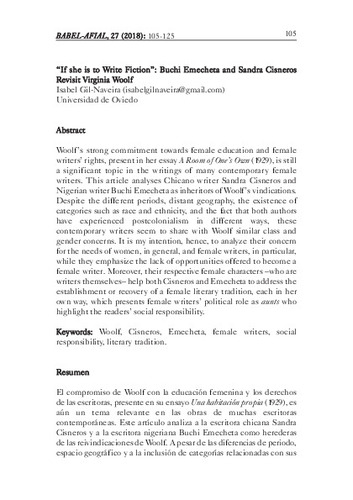‘If she is to write fiction’: Buchi Emecheta and Sandra Cisneros Revisit Virginia Woolf
Autor(es) y otros:
Palabra(s) clave:
Woof, Cisneros, Emecheta, female writers, social responsibility, literary tradition
Fecha de publicación:
Versión del editor:
Citación:
Descripción física:
Resumen:
Woolf's strong commitment towards female education and female writers' rights, present in her essay A Room of One's Own (1929), is still a significant topic in the writings of many contemporary female writers. This article analyses Chicano writer Sandra Cisneros and Nigerian writer Buchi Emecheta as inheritors of Woolf’s vindications. Despite the different periods, distant geography, the existence of categories such as race and ethnicity, and the fact that both authors have experienced postcolonialism in different ways, these contemporary writers seem to share with Woolf similar class and gender concerns. It is my intention, hence, to analyze their concern for the needs of women, in general, and female writers, in particular, while they emphasize the lack of opportunities offered to become a female writer. Moreover, their respective female characters –who are writers themselves– help both Cisneros and Emecheta to address the establishment or recovery of a female literary tradition, each in her own way, which presents female writers’ political role as aunts who highlight the readers’ social responsibility.
Woolf's strong commitment towards female education and female writers' rights, present in her essay A Room of One's Own (1929), is still a significant topic in the writings of many contemporary female writers. This article analyses Chicano writer Sandra Cisneros and Nigerian writer Buchi Emecheta as inheritors of Woolf’s vindications. Despite the different periods, distant geography, the existence of categories such as race and ethnicity, and the fact that both authors have experienced postcolonialism in different ways, these contemporary writers seem to share with Woolf similar class and gender concerns. It is my intention, hence, to analyze their concern for the needs of women, in general, and female writers, in particular, while they emphasize the lack of opportunities offered to become a female writer. Moreover, their respective female characters –who are writers themselves– help both Cisneros and Emecheta to address the establishment or recovery of a female literary tradition, each in her own way, which presents female writers’ political role as aunts who highlight the readers’ social responsibility.
Colecciones
- Artículos [37544]
- Filología Inglesa, Francesa y Alemana [591]
Ficheros en el ítem





